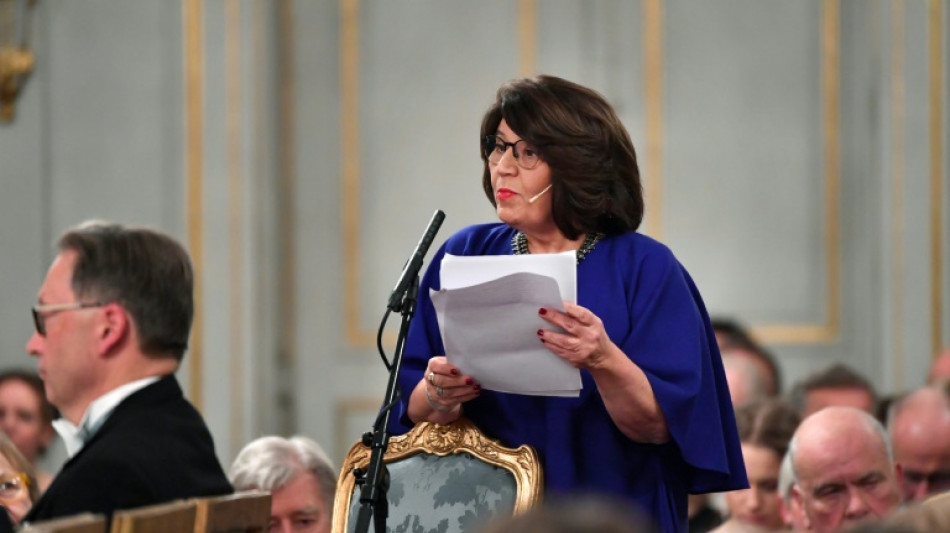
-
 Israel cancels visas for French lawmakers
Israel cancels visas for French lawmakers
-
Russia and Ukraine trade blame over Easter truce, as Trump predicts 'deal'

-
 Valverde stunner saves Real Madrid title hopes against Bilbao
Valverde stunner saves Real Madrid title hopes against Bilbao
-
Ligue 1 derby interrupted after assistant referee hit by projectile
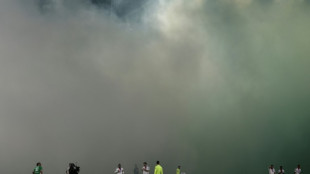
-
 Leclerc bags Ferrari first podium of the year
Leclerc bags Ferrari first podium of the year
-
Afro-Brazilian carnival celebrates cultural kinship in Lagos

-
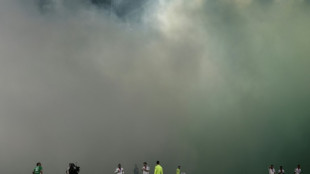 Ligue 1 derby halted after assistant referee hit by projectile
Ligue 1 derby halted after assistant referee hit by projectile
-
Thunder rumble with record win over Memphis in playoff opener

-
 Leverkusen held at Pauli to put Bayern on cusp of title
Leverkusen held at Pauli to put Bayern on cusp of title
-
Israel says Gaza medics' killing a 'mistake,' to dismiss commander

-
 Piastri power rules in Saudi as Max pays the penalty
Piastri power rules in Saudi as Max pays the penalty
-
Leaders Inter level with Napoli after falling to late Orsolini stunner at Bologna

-
 David rediscovers teeth as Chevalier loses some in nervy Lille win
David rediscovers teeth as Chevalier loses some in nervy Lille win
-
Piastri wins Saudi Arabian Grand Prix, Verstappen second

-
 Kohli, Rohit star as Bengaluru and Mumbai win in IPL
Kohli, Rohit star as Bengaluru and Mumbai win in IPL
-
Guirassy helps Dortmund past Gladbach, putting top-four in sight

-
 Alexander-Arnold lauds 'special' Liverpool moments
Alexander-Arnold lauds 'special' Liverpool moments
-
Pina strikes twice as Barca rout Chelsea in Champions League semi

-
 Rohit, Suryakumar on song as Mumbai hammer Chennai in IPL
Rohit, Suryakumar on song as Mumbai hammer Chennai in IPL
-
Dortmund beat Gladbach to keep top-four hopes alive

-
 Leicester relegated from the Premier League as Liverpool close in on title
Leicester relegated from the Premier League as Liverpool close in on title
-
Alexander-Arnold fires Liverpool to brink of title, Leicester relegated

-
 Maresca leaves celebrations to players after Chelsea sink Fulham
Maresca leaves celebrations to players after Chelsea sink Fulham
-
Trump eyes gutting US diplomacy in Africa, cutting soft power: draft plan

-
 Turkey bans elective C-sections at private medical centres
Turkey bans elective C-sections at private medical centres
-
Lebanon army says 3 troops killed in munitions blast in south

-
 N.America moviegoers embrace 'Sinners' on Easter weekend
N.America moviegoers embrace 'Sinners' on Easter weekend
-
Man Utd 'lack a lot' admits Amorim after Wolves loss

-
 Arteta hopes Arsenal star Saka will be fit to face PSG
Arteta hopes Arsenal star Saka will be fit to face PSG
-
Ukrainian troops celebrate Easter as blasts punctuate Putin's truce

-
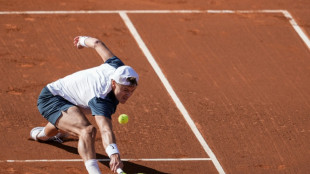 Rune defeats Alcaraz to win Barcelona Open
Rune defeats Alcaraz to win Barcelona Open
-
Outsider Skjelmose in Amstel Gold heist ahead of Pogacar and Evenepoel

-
 Arsenal make Liverpool wait for title party, Chelsea beat Fulham
Arsenal make Liverpool wait for title party, Chelsea beat Fulham
-
Trump slams 'weak' judges as deportation row intensifies

-
 Arsenal stroll makes Liverpool wait for title as Ipswich face relegation
Arsenal stroll makes Liverpool wait for title as Ipswich face relegation
-
Sabalenka to face Ostapenko in Stuttgart final
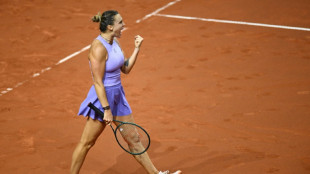
-
 Kohli, Padikkal guide Bengaluru to revenge win over Punjab
Kohli, Padikkal guide Bengaluru to revenge win over Punjab
-
US aid cuts strain response to health crises worldwide: WHO

-
 Birthday boy Zverev roars back to form with Munich win
Birthday boy Zverev roars back to form with Munich win
-
Ostapenko eases past Alexandrova into Stuttgart final
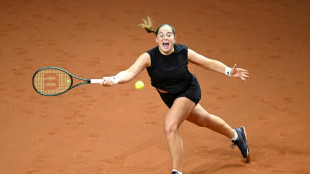
-
 Zimbabwe on top in first Test after Bangladesh out for 191
Zimbabwe on top in first Test after Bangladesh out for 191
-
De Bruyne 'surprised' over Man City exit

-
 Frail Pope Francis takes to popemobile to greet Easter crowd
Frail Pope Francis takes to popemobile to greet Easter crowd
-
Lewandowski injury confirmed in blow to Barca quadruple bid

-
 Russia and Ukraine accuse each other of breaching Easter truce
Russia and Ukraine accuse each other of breaching Easter truce
-
Zimbabwe bowl Bangladesh out for 191 in first Test in Sylhet

-
 Ukrainians voice scepticism on Easter truce
Ukrainians voice scepticism on Easter truce
-
Pope wishes 'Happy Easter' to faithful in appearance at St Peter's Square

-
 Sri Lanka police probe photo of Buddha tooth relic
Sri Lanka police probe photo of Buddha tooth relic
-
Home hero Wu wows Shanghai crowds by charging to China Open win


Jila Mossaed, from refugee poet to Swedish Academy
Jila Mossaed fled Iran for Sweden in 1986, a 38-year-old poet who spoke no Swedish. Three decades later, she became the first foreigner inducted into Sweden's highest language authority, the Swedish Academy, which awards the Nobel Prize in Literature.
Now she writes in Farsi and Swedish, but Mossaed struggled for years to learn Swedish and still stumbles over pronunciation, she told AFP in the halls of the Academy, founded in 1786 by King Gustav III to promote the Swedish language and literature.
The 76-year-old, whose work explores life, death, politics, love, exile and nature, never expected to join the Academy in 2018.
The 18 Academy members are appointed for life.
"It's such an unbelievable honour. I'm so proud of it," she said, her dark eyes beaming.
Mossaed is tight-lipped on the Nobel prize to be announced Thursday, but says she sees her Academy role in general as broadening horizons.
"I carry with me an ancient, rich language spoken by 300 million people."
"To open new windows to unknown literature and introduce it is an interesting and important contribution," she said.
In 1986, Mossaed fled Iran with her two young children after a book of her poetry received "very threatening and humiliating" criticism from the Islamic Republic's authorities.
"Soldiers came to my house with weapons and took many things," she recalled.
She was summoned to a censorship office. "When I left I thought, 'This isn't my country anymore'."
"I had no plan. I didn't know what it meant to be a refugee or which country I would end up in."
A smuggler told her Sweden and Denmark were easiest to get to.
She knew of Ingmar Bergman, August Strindberg and Pippi Longstocking, so Sweden it was.
- 'The North is my grave' -
For the first two years, she spoke only English and bought no curtains, thinking she would not stay long.
But eventually, "I realised I had to learn the language. It was hard," she said, speaking fluent but accented Swedish.
When she began writing in Swedish, "it was like there was a corpse beside me, and on it, it said 'Farsi'."
"It started gasping for air. 'I'm going to die,' it said."
"I said, 'No, don't die. I'm going to write in Farsi too, I won't forget you."
After 10 years she had written 13 poems in Swedish.
"I realised I had left my cradle and the North was my grave."
Mossaed has published 10 poetry collections in Swedish since her first book, "Månen och den eviga kon" (The Moon and the Eternal Cow), in 1997.
She insists she is still "not very good at Swedish" -- she jokes about her pronunciation and takes her time on grammar. That is unexpected for a member of an academy revered as bearers of high culture and defenders of the language.
But rather than get stuck on details, "I wanted to approach the language's soul," which she describes as "tranquility", "silence" and "nature".
"I appreciate so much that people here don't get worked up over things like religion."
- Openly critical -
Her writing changed in Sweden.
In Iran, "we're used to being put under pressure by mullahs, religion and kings, so we've always found a way to write around that."
"I didn't want to do that in Sweden, I want to be straightforward. I love the truth."
Born into a non-religious family, Mossaed is now openly critical of the Iranian government in her poetry and occasional commentaries.
"I'm glad that people now understand what it means when Islam takes power," she said, labelling the current government "brutal".
"They kill people, execute people, humiliate and whip women."
She believes the government's power is coming to an end, as Iranians "now dare to criticise and ask questions".
But "it will take time and it will be bloody. The people will pay a high price."
While her Swedish poems are "braver, politically", the language is "simpler".
When she writes in Farsi, "it's like diving into an ocean of words".
"When I write in Swedish, it's like I'm standing beside a pool."
"I'm happy that the simplicity gave me more freedom. And the critics say it's good!" she said with a laugh.
Her poems come to her suddenly, "like brain attacks", but it has been months since a poem came to her in Farsi, and she dreams and writes grocery lists in Swedish these days.
Mossaed lived in Sweden's western province of Varmland for many years. It was hard to get to know people, but she learned to love the forest.
Walking in the woods, she would reach out to touch branches.
"I said 'Taste my hand, it comes from the desert'."
"Sometimes I think the forest accepted me faster than people did."
A.Malone--AMWN

